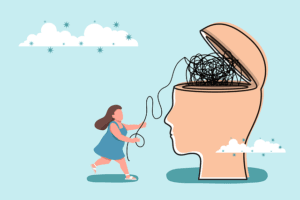In today’s fast-paced world, getting adequate and quality sleep can be a challenge, yet it is crucial for maintaining overall well-being. A well-established sleep routine has a profound impact on physical health, emotional stability, and cognitive function. Developing a consistent and innovative sleep routine can help you fall asleep more quickly, enjoy deeper sleep, and wake up feeling more refreshed and energized. This comprehensive guide explores innovative tips for a better sleep routine, including scientific insights, practical techniques, and lifestyle adjustments to improve your sleep hygiene.
Understanding Sleep and Its Importance
Before diving into innovative tips for a better sleep routine, it’s essential to understand the importance of sleep. Sleep is a vital biological process that helps the body repair itself, consolidate memories, and regulate hormone production. Without proper sleep, cognitive functions like concentration and problem-solving decline, while emotional balance can become disrupted, leading to heightened stress and anxiety. Moreover, chronic sleep deprivation can increase the risk of serious health issues, including obesity, diabetes, cardiovascular diseases, and mental health disorders.
Innovative sleep routines are not just about getting enough sleep but improving the quality of sleep. A solid sleep routine can result in the following benefits:
- Enhanced Cognitive Function: Better sleep improves memory, focus, and mental clarity.
- Emotional Stability: Quality sleep helps regulate emotions and reduces anxiety and depression.
- Physical Health: Sleep supports immune function, metabolism, and overall physical well-being.
1. Create a Sleep-Inducing Environment
One of the most innovative tips for a better sleep routine is optimizing your sleep environment. The space in which you sleep plays a significant role in how well you rest. Here’s how to create an ideal sleep environment:
- Optimize Temperature: Keep the room cool, as cooler temperatures between 60 and 67 degrees Fahrenheit (15-19°C) are known to promote better sleep. Experiment with fans, blankets, and your thermostat to find what works best for you.
- Minimize Noise: Noise disturbances can prevent you from falling asleep or cause frequent awakenings. Consider using white noise machines, earplugs, or noise-canceling devices to block out disruptions. Alternatively, calming ambient music or nature sounds can help create a peaceful atmosphere.
- Control Light Levels: Exposure to bright light in the evening interferes with melatonin production, making it harder to fall asleep. Use blackout curtains to block external light or wear a sleep mask. If you use electronic devices before bed, ensure that they are set to night mode or equipped with blue light filters.
- Invest in Quality Bedding: Your mattress and pillows should provide the right support for your sleep position, whether you sleep on your back, side, or stomach. Consider upgrading to high-quality bedding materials that enhance comfort and breathability, which can make a significant difference in your sleep quality.
2. Establish a Consistent Sleep Schedule
One of the core elements of an innovative sleep routine is maintaining a regular sleep schedule. Keeping your internal body clock in check can help you fall asleep faster and wake up more naturally.
- Set Fixed Sleep and Wake Times: Consistency is key. Going to bed and waking up at the same time every day, even on weekends, reinforces your body’s natural circadian rhythm. This consistency can reduce the likelihood of tossing and turning at night.
- Develop a Pre-Sleep Ritual: Engage in calming pre-sleep activities to signal to your body that it’s time to wind down. This could include activities like reading a book, meditating, practicing gentle yoga, or even taking a warm bath. A consistent pre-sleep ritual trains your brain to associate these activities with bedtime.
- Limit Naps: While napping can be beneficial, especially when you are sleep-deprived, long naps or naps taken late in the day can disrupt your nighttime sleep routine. Aim for 20-30 minute naps, ideally before mid-afternoon, to avoid interference with your night’s rest.
3. Incorporate Technology Wisely
In today’s digital world, technology can either be a hindrance or a help when it comes to sleep. The key is to use it wisely.
- Sleep Tracking Apps: Many sleep tracking apps, such as Sleep Cycle or Calm, offer insights into your sleep patterns. These apps track how much deep sleep, light sleep, and REM sleep you get each night, helping you identify areas for improvement. Some even provide soothing bedtime stories, sleep sounds, or guided meditations.
- Smart Lighting: Invest in smart lighting systems that mimic natural daylight cycles. These lights gradually dim as bedtime approaches and simulate sunrise in the morning, helping regulate your circadian rhythm naturally.
- Blue Light Filters: Blue light emitted by phones, tablets, and computer screens can delay melatonin production, making it harder to fall asleep. Activate the blue light filter or “night mode” on your devices a few hours before bed. Alternatively, consider blue light-blocking glasses to prevent interference with your sleep.
4. Mind Your Diet
What you eat and drink throughout the day has a direct impact on your sleep quality. Here are some innovative tips for a better sleep routine related to diet:
- Limit Caffeine and Nicotine: These substances are stimulants that can interfere with your ability to fall asleep. Ideally, you should avoid caffeine and nicotine six hours before bedtime. Remember, caffeine is found not only in coffee but also in tea, chocolate, and some sodas.
- Be Mindful of Alcohol: While alcohol may initially make you feel sleepy, it disrupts your sleep cycles, leading to fragmented and low-quality rest. If you drink alcohol, limit it, and avoid consuming it close to bedtime.
- Eat Sleep-Friendly Foods: Foods that contain tryptophan, magnesium, and melatonin can promote sleep. Examples include bananas, almonds, turkey, oats, and cherries. Consider including these in your evening meals or snacks for better sleep.
5. Exercise Regularly
Exercise is a powerful tool for improving sleep, but timing is crucial when integrating physical activity into your sleep routine:
- Exercise Daily: Regular moderate physical activity, such as walking, swimming, or yoga, can help you fall asleep faster and enjoy deeper sleep. Aim for at least 30 minutes of exercise most days of the week.
- Avoid Late-Night Workouts: Vigorous exercise late in the evening can energize you and make it harder to wind down. Morning or early afternoon workouts are ideal for promoting better sleep later in the day.
6. Manage Stress and Anxiety
Stress and anxiety are among the leading causes of sleep disturbances. Incorporating relaxation techniques into your sleep routine can help you manage these feelings:
- Mindfulness and Meditation: Practicing mindfulness or meditation can help calm your mind and body before bed. Apps like Headspace or Calm offer guided meditation specifically designed to promote relaxation and sleep.
- Journaling: If racing thoughts keep you awake, try writing them down before bed. Journaling can help you offload worries and organize your thoughts, making it easier to relax.
- Breathing Exercises: Deep, slow breathing exercises can help relax your nervous system and reduce stress. Try inhaling deeply for a count of four, holding your breath for four, and exhaling slowly for four.
7. Seek Professional Help When Needed
If you’ve tried adjusting your sleep routine and still struggle with sleep, it may be time to seek professional help. Conditions like chronic insomnia or sleep apnea can seriously impact your health and well-being, so don’t hesitate to consult a doctor or sleep specialist.
8. Use Aromatherapy for Better Sleep
Aromatherapy can be a soothing addition to your sleep routine. Certain scents are known to promote relaxation and enhance sleep quality:
- Lavender Oil: Lavender is one of the most well-known essential oils for promoting sleep. It reduces anxiety and can be used in a diffuser, as a spray on your pillow, or in a bath before bed.
- Chamomile and Sandalwood: These scents also promote relaxation and can help create a calming sleep environment. Look for essential oils or scented candles infused with these aromas.
- Herbal Teas: Drinking herbal teas like chamomile or valerian root tea before bed can also promote relaxation and signal to your body that it’s time to rest.
9. Consider Natural Sleep Aids
If you’ve optimized your sleep environment and routine but still struggle with sleep, natural sleep aids can help. Always consult a healthcare provider before starting supplements.
- Melatonin Supplements: Melatonin is a hormone naturally produced by your body that regulates sleep-wake cycles. Taking melatonin supplements can help people with insomnia or jet lag reset their internal clock.
- Herbal Supplements: Valerian root, passionflower, and magnesium are all known for their calming properties and can help promote better sleep. Ensure you use these supplements as directed to avoid any unwanted side effects.
- CBD Products: Cannabidiol (CBD) is gaining popularity as a sleep aid, with many users reporting better sleep quality. Research is ongoing, but some studies suggest it may help reduce anxiety and promote deeper sleep.
10. Limit Fluid Intake Before Bed
Limiting your fluid intake in the evening can prevent frequent trips to the bathroom during the night, which can disrupt your sleep routine. Make sure to hydrate throughout the day and reduce fluid intake in the last two hours before bed.
11. Engage in Relaxing Activities Before Bed
Introducing relaxing activities into your pre-sleep routine can help signal to your body that it’s time to wind down:
- Reading: Choose light, calming reading materials before bed to ease into sleep. Avoid stimulating content that might keep your mind active.
- Gentle Yoga: Gentle yoga poses or stretches before bed can help relieve muscle tension and promote relaxation.
- Calming Music or White Noise: Soothing music or white noise can help you relax and drown out any background noises that might disturb your sleep.
12. Assess Your Sleep Needs
Lastly, remember that everyone’s sleep needs are different. Some people feel their best with seven hours of sleep, while others may need nine. Tracking your sleep with apps or a sleep diary can help you better understand your sleep patterns and make necessary adjustments.
Conclusion
Improving your sleep routine is a gradual process that requires consistency and mindfulness. By integrating these innovative tips—optimizing your sleep environment, establishing a consistent schedule, incorporating technology wisely, and addressing stress—you can cultivate a sleep routine that enhances the quality of your rest and contributes to your overall health. Prioritize your sleep, experiment with different strategies, and be patient as your body adjusts to these positive changes. In time, you’ll experience the profound benefits of a well-rested mind and body.






